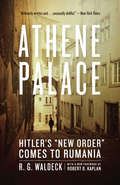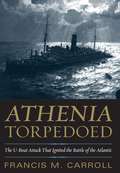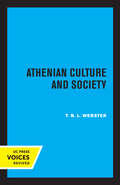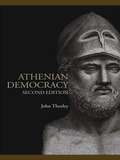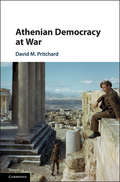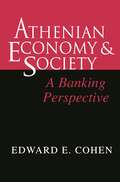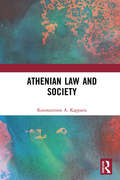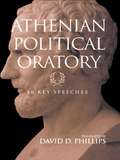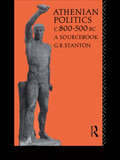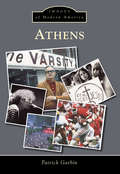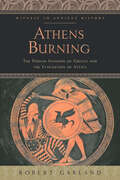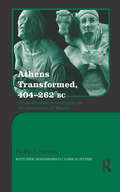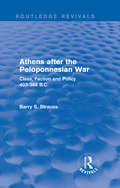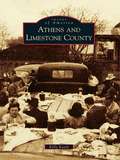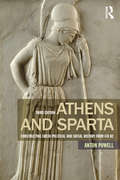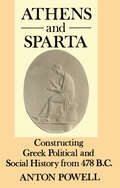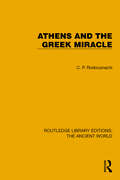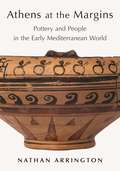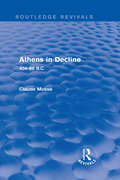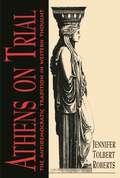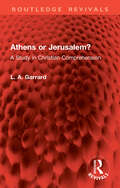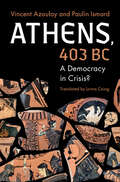- Table View
- List View
Athene Palace: Hitler's "New Order" Comes to Rumania
by R.G. WaldeckOn the day that Paris fell to the Nazis, R. G. Waldeck was checking into the swankiest hotel in Bucharest, the Athene Palace. A cosmopolitan center during the war, the hotel was populated by Italian and German oilmen hoping to secure new business opportunities in Romania, international spies cloaked in fake identities, and Nazi officers whom Waldeck discovered to be intelligent but utterly bloodless. A German Jew and a reporter for Newsweek, Waldeck became a close observer of the Nazi invasion. As King Carol first tried to placate the Nazis, then abdicated the throne in favor of his son, Waldeck was dressing for dinners with diplomats and cozying up to Nazi officers to get insight and information. From her unique vantage, she watched as Romania, a country with a pro-totalitarian elite and a deep strain of anti-Semitism, suffered civil unrest, a German invasion, and an earthquake, before turning against the Nazis. A striking combination of social intimacy and disinterest political analysis, Athene Palace evokes the elegance and excitement of the dynamic international community in Bucharest before the world had comes to grips with the horrors of war and genocide. Waldeck’s account strikingly presents the finely wrought surface of dinner parties, polite discourse, and charisma, while recognizing the undercurrents of violence and greed that ran through the denizens of Athene Palace.
Athenia Torpedoed
by Francis M. CarrollThis book is an account of a disaster at sea, the sinking by a German submarine of the passenger liner Athenia sailing from Liverpool to Montreal, loaded with Americans, Canadians, and Europeans, attempting to cross the Atlantic before the outbreak of war. Although 112 people were lost, of whom 30 were the first Americans killed in the war, 1,306 were rescued. Housewives, children, college students, scientists, actresses, and Jewish refugees were among the victims, and even young John F. Kennedy was called on to give assistance. The drama, tragedy, and triumph of their experiences are a central part of the story. But of course the book is also about war and politics. Indeed, this is actually where the Second World War began. Here Germany, having already invaded Poland in what was expected to be a limited war, first struck the western Allies, Britain and France. This was the first blow, fired without warning, just hours after war was declared. For Britain, the sinking of the Athenia was seen as both a violation of international law and a return to the kind of total war Germany had waged in the Great War. The sinking of the Athena immediately pushed Britain to adopt convoys to protect shipping, and it served from the first to shape British public opinion toward the war. In Canada the sinking of the ship and particularly the death of the innocent, ten year old Margaret Hayworth, became emotional issues around which much of the nation could rally in support of the decision of Parliament to go to war. In the United States President Franklin D. Roosevelt was too wary to make the sinking of the Athenia the counterpart of the sinking of the Lusitania in the First World War. However, the Athenia exposed Germany in the public mind as a serious threat to Americans, and provided the opportunity for President Roosevelt to open direct communication with Winston Churchill. The Athenia helped to change public opinion in the United States sufficiently to amend the existing Neutrality Laws to allow the country to sell munitions and supplies to Britain and France-a supportive first step to meeting the Nazi threat directly. So the sinking of the Athenia is a tale full of meaning and passion that deserves to be known.
Athenian Culture and Society
by T.B.L. WebsterThis title is part of UC Press's Voices Revived program, which commemorates University of California Press’s mission to seek out and cultivate the brightest minds and give them voice, reach, and impact. Drawing on a backlist dating to 1893, Voices Revived makes high-quality, peer-reviewed scholarship accessible once again using print-on-demand technology. This title was originally published in 1973.
Athenian Democracy (Lancaster Pamphlets in Ancient History)
by John ThorleyThe fifth century BC witnessed not only the emergence of one of the first democracies, but also the Persian and the Peloponnesian Wars. John Thorley provides a concise analysis of the development and operation of Athenian democracy against this backdrop. Taking into account both primary source material and the work of modern historians, Athenian Democracy examines:* the prelude to democracy* how the democractic system emerged* how this system worked in practice* the efficiency of this system of government* the success of Athenian democracy.Including a useful chronology and blibliography, this second edition has been updated to take into account recent research.
Athenian Democracy at War
by David M. PritchardClassical Athens perfected direct democracy. The plays of this ancient Greek state are still staged today. These achievements are rightly revered. Less well known is the other side of this success story. Democratic Athens completely transformed warfare and became a superpower. The Athenian armed forces were unmatched in size and professionalism. This book explores the major reasons behind this military success. It shows how democracy helped the Athenians to be better soldiers. For the first time David M. Pritchard studies, together, all four branches of the armed forces. He focuses on the background of those who fought Athens' wars and on what they thought about doing so. His book reveals the common practices that Athens used right across the armed forces and shows how Athens' pro-war culture had a big impact on civilian life. The book puts the study of Athenian democracy at war on an entirely new footing.
Athenian Economy and Society: A Banking Perspective
by Edward CohenIn this ground-breaking analysis of the world's first private banks, Edward Cohen convincingly demonstrates the existence and functioning of a market economy in ancient Athens while revising our understanding of the society itself. Challenging the "primitivistic" view, in which bankers are merely pawnbrokers and money-changers, Cohen reveals that fourth-century Athenian bankers pursued sophisticated transactions. These dealings--although technologically far removed from modern procedures--were in financial essence identical with the lending and deposit-taking that separate true "banks" from other businesses. He further explores how the Athenian banks facilitated tax and creditor avoidance among the wealthy, and how women and slaves played important roles in these family businesses--thereby gaining legal rights entirely unexpected in a society supposedly dominated by an elite of male citizens. Special emphasis is placed on the reflection of Athenian cognitive patterns in financial practices. Cohen shows how transactions were affected by the complementary opposites embedded in the very structure of Athenian language and thought. In turn, his analysis offers great insight into daily Athenian reality and cultural organization.
Athenian Law and Society
by Konstantinos A. KapparisAthenian Law and Society focuses upon the intersection of law and society in classical Athens, in relation to topics like politics, class, ability, masculinity, femininity, gender studies, economics, citizenship, slavery, crime, and violence. The book explores the circumstances and broader context which led to the establishment of the laws of Athens, and how these laws influenced the lives and action of Athenian citizens, by examining a wide range of sources from classical and late antique history and literature. Kapparis also explores later literature on Athenian law from the Renaissance up to the 20th and 21st centuries, examining the long-lasting impact of the world’s first democracy. Athenian Law and Society is a study of the intersection between law and society in classical Athens that has a wide range of applications to study of the Athenian polis, as well as law, democracy, and politics in both classical and more modern settings.
Athenian Political Oratory: Sixteen Key Speeches (Routledge Sourcebooks for the Ancient World)
by David PhillipsFirst published in 2004. Routledge is an imprint of Taylor & Francis, an informa company.
Athenian Politics c800-500 BC: A Sourcebook (Routledge Sourcebooks for the Ancient World)
by G. R. StantonFirst published in 1990. Routledge is an imprint of Taylor & Francis, an informa company.
Athens
by James H.S. McGregorRevered as the birthplace of Western thought and democracy, Athens is much more than an open-air museum filled with crumbling monuments to ancient glory. Athens takes readers on a journey from the classical city-state to today's contemporary capital, revealing a world-famous metropolis that has been resurrected and redefined time and again. Although the Acropolis remains the city's anchor, Athens' vibrant culture extends far beyond the Greek city's antique boundaries. James H. S. McGregor points out how the cityscape preserves signs of the many actors who have crossed its historical stage. Alexander the Great incorporated Athens into his empire, as did the Romans. Byzantine Christians repurposed Greek temples, the Parthenon included, into churches. From the thirteenth to fifteenth centuries, the city's language changed from French to Spanish to Italian, as Crusaders and adventurers from different parts of Western Europe took turns sacking and administering the city. An Islamic Athens took root following the Ottoman conquest of 1456 and remained in place for nearly four hundred years, until Greek patriots finally won independence in a blood-drenched revolution. Since then, Athenians have endured many hardships, from Nazi occupation and military coups to famine and economic crisis. Yet, as McGregor shows, the history of Athens is closer to a heroic epic than a Greek tragedy. Richly supplemented with maps and illustrations, Athens paints a portrait of one of the world's great cities, designed for travelers as well as armchair students of urban history.
Athens (Images of Modern America)
by Patrick GarbinFrom the early 1960s to the present, perhaps no college town in America has changed as much as Athens, Georgia. Over the course of 50 years, the city experienced desegregation at all levels of education, encountered all types of activism and demonstrations, and established an unparalleled music scene that still flourishes. Beginning in the 1980s, University of Georgia athletic teams began winning national championships and continue to do so, the 1996 Olympics came to Athens, and the downtown district is no longer a retail center but a 24-hour central city with more restaurants, bars, and eclectic shops than one can count. Athens is no longer the sleepy, small college town it once was, but truly "the Classic City" in every sense of the name.
Athens After the Peloponnesian War: Class, Faction, and Policy 403-386 BE
by Barry S. StraussAthens at the beginning of its reign of intellectual brilliance.
Athens Burning: The Persian Invasion of Greece and the Evacuation of Attica (Witness to Ancient History)
by Robert GarlandThe gripping story of how the Athenians survived the Persian invasion of their homeland—one of the central events in ancient Greek history.Winner of the CHOICE Outstanding Academic Title of the Choice ACRLBetween June 480 and August 479 BC, tens of thousands of Athenians evacuated, following King Xerxes’ victory at the Battle of Thermopylae. Abandoning their homes and ancestral tombs in the wake of the invading Persian army, they sought refuge abroad. Women and children were sent to one safe haven, the elderly to another, while all men of military age were conscripted into the fleet. During this difficult year of exile, the city of Athens was set on fire not once, but twice. In Athens Burning, Robert Garland explores the reasons behind the decision to abandon Attica, the peninsular region of Greece that includes Athens, while analyzing the consequences, both material and psychological, of the resulting invasion.Garland introduces readers to the contextual background of the Greco-Persian wars, which include the famous Battle of Marathon. He describes the various stages of the invasion from both the Persian and Greek point of view and explores the siege of the Acropolis, the defeat of the Persians first by the allied Greek navy and later by the army, and, finally, the return of the Athenians to their land.Taking its inspiration from the sufferings of civilians, Athens Burning also works to dispel the image of the Persians as ruthless barbarians. Addressing questions that are largely ignored in other accounts of the conflict, including how the evacuation was organized and what kind of facilities were available to the refugees along the way, Garland demonstrates the relevance of ancient history to the contemporary world. This compelling story is especially resonant in a time when the news is filled with the suffering of nearly 5 million people driven by civil war from their homes in Syria. Aimed at students and scholars of ancient history, this highly accessible book will also fascinate anyone interested in the burgeoning fields of refugee and diaspora studies.
Athens Burning: The Persian Invasion of Greece and the Evacuation of Attica (Witness to Ancient History)
by Robert Garland“A fresh approach to the Greco-Persian wars focusing on Athens’s evacuation, Persian occupation, and rebuilding . . . [a] compelling book.” —John O. Hyland, Christopher Newport UniversityWinner of the Choice Outstanding Academic TitleBetween June 480 and August 479 BC, tens of thousands of Athenians evacuated, following King Xerxes’ victory at the Battle of Thermopylae. Abandoning their homes and ancestral tombs in the wake of the invading Persian army, they sought refuge abroad. During this difficult year of exile, the city of Athens was set on fire not once, but twice. In Athens Burning, Robert Garland explores the reasons behind the decision to abandon Attica, the peninsular region of Greece that includes Athens, while analyzing the consequences, both material and psychological, of the resulting invasion.Taking its inspiration from the sufferings of civilians, Athens Burning also works to dispel the image of the Persians as ruthless barbarians. Addressing questions that are largely ignored in other accounts of the conflict, including how the evacuation was organized and what kind of facilities were available to the refugees along the way, Garland demonstrates the relevance of ancient history to the contemporary world. This compelling story is especially resonant in a time when the news is filled with the suffering of nearly 5 million people driven by civil war from their homes in Syria. Aimed at students and scholars of ancient history, this highly accessible book will also fascinate anyone interested in the burgeoning fields of refugee and diaspora studies.“The fullest account of the Persian sack of Athens in September 480 and in June 479 BCE available in English.” —Canadian Journal of History
Athens Transformed, 404-262 BC: From Popular Sovereignty to the Dominion of Wealth (Routledge Monographs in Classical Studies)
by Phillip HardingDuring the heady, democratic days of the fifth and fourth centuries, the poorer members of Athenian society, the lower two classes of zeugitai and thetes, enjoyed an unprecedented dominance in both domestic and foreign politics. At home, the participatory nature of the constitution required their presence not only in the lawcourts and assembly, but also in most of the minor magistracies; abroad, they were the driving force of the navy, which ensured Athens’ control of the Aegean and the Black seas. Their participation at all levels was made possible by state pay (for jury duty, attendance in the assembly, public office and military service). In the fifth century state pay was financed largely through the tribute paid by members of the empire, supplemented by the liturgical contributions of the rich and, beginning during the war, a property tax (the eisphora). In the fourth century, almost the whole burden was shouldered by taxation upon the wealthy, especially those who owned property. In this book, author Phillip Harding traces the major changes that occurred in the administration of the state that eventually deprived the lower classes of their supremacy and transferred power into the hands of the wealthy land-owners. Things changed radically after Athens’ defeat in the Lamian (or Hellenic) War in 322BC. Over the next several decades, restriction of the franchise, elimination of pay for some public offices, the loss of the navy, the increased dependence upon local grain from the larger estates in Attika, the removal of the tax burden from the rich by the ending of such major liturgies as the trierarchia and the choregia and the abandoning of the eisphora all contributed to this transformation.
Athens after the Peloponnesian War: Class, Faction and Policy 403-386 B.C. (Routledge Revivals)
by Barry StraussHistorians are used to studying the origins of war. The rebuilding in the aftermath of war is a subject that – at least in the case of Athens – has received far less attention. Along with the problems of reconstructing the economy and replenishing the population, the problem of renegotiating political consensus was equally acute. Athens after the Peloponnesian War, first published in 1986, undertakes a radically new investigation into the nature of Athenian political groups. The general model of ‘faction’ provided by political anthropology provides an indispensable paradigm for the Athenian case. More widely, Professor Strauss argues for the importance of the economic, social and ideological changes resulting from the Peloponnesian War in the development of political nexus. Athens after the Peloponnesian War offers a detailed demographic analysis, astute insight into political discourse, and is altogether one of the most thorough treatments of this important period in the Athenian democracy.
Athens and Limestone County
by Kelly KazekAthens and Limestone County were founded in 1818, the year before Alabama became a state, making Athens one of its oldest cities. The quaint, picturesque downtown square in Athens, the county seat, is the heart of the community. Athens and Limestone County are studies in the ongoing tug-of-war between tradition and progress. Athens is traditionally a railroad and cotton town--once ranking among the state's largest cotton producers--but since the aerospace boom of the 1960s, it has increasingly entered the orbit of the technology center of nearby Huntsville, home of the U.S. Space and Rocket Center and Redstone Arsenal. These days, Athens is home to many manufacturing firms, and local civic groups are focused on revitalizing downtown and bringing tourists to Limestone County.
Athens and Sparta: Constructing Greek Political and Social History from 478 BC
by Anton PowellAthens and Sparta is an essential textbook for the study of Greek history. Providing a comprehensive account of the two key Greek powers in the years after 478 BC, it charts the rise of Athens from city-state to empire after the devastation of the Persian Wars, and the increasing tensions with their rivals, Sparta, culminating in the Peloponnesian Wars. As well as the political history of the period, it also offers an insight into the radically different political systems of these two superpowers, and explores aspects of social history such as Athenian democracy, life in Sparta, and the lives of Athenian women. More than this though, it encourages students to develop their critical skills, guiding them in how to think about history, demonstrating in a lucid way the techniques used in interpreting the ancient sources. In this new third edition, Anton Powell includes discussion of the latest scholarship on this crucial period in Greek history. Its bibliography has been renewed, and for the first time it includes numerous photographs of Greek sites and archaeological objects discussed in the text. Written in an accessible style and covering the key events of the period – the rise to power of Athens, the unusual Spartan state, and their rivalry and eventual clash in all out war – this is an invaluable tool for students of the history of Greece in the fifth century BC.
Athens and Sparta: Constructing Greek Political and Social History from 478 BC
by Anton PowellAthens and Sparta has established itself as a handbook to the main topics of Greek history in the classical period. It deals not only with the established areas of political history, but also with some of the most important aspects of Greek social history and historical methods to the main topics of Greek history in the classical period.
Athens and the Greek Miracle (Routledge Library Editions: The Ancient World)
by C.P. RodocanachiAthens and the Greek Miracle (1948) is a work of interpretation, poetic in character rather than scientific or historical, that attempts to penetrate some of the primary causes of this unique Athenian culture, to evoke its past spirit in the modern world.
Athens at the Margins: Pottery and People in the Early Mediterranean World
by Nathan T. ArringtonHow the interactions of non-elites influenced Athenian material culture and societyThe seventh century BC in ancient Greece is referred to as the Orientalizing period because of the strong presence of Near Eastern elements in art and culture. Conventional narratives argue that goods and knowledge flowed from East to West through cosmopolitan elites. Rejecting this explanation, Athens at the Margins proposes a new narrative of the origins behind the style and its significance, investigating how material culture shaped the ways people and communities thought of themselves.Athens and the region of Attica belonged to an interconnected Mediterranean, in which people, goods, and ideas moved in unexpected directions. Network thinking provides a way to conceive of this mobility, which generated a style of pottery that was heterogeneous and dynamic. Although the elite had power, they were unable to agree on the norms of conspicuous consumption and status display. A range of social actors used objects, contributing to cultural change and to the socially mediated production of meaning. Historiography and the analysis of evidence from a wide range of contexts—cemeteries, sanctuaries, workshops, and symposia—offers the possibility to step outside the aesthetic frameworks imposed by classical Greek masterpieces and to expand the canon of Greek art.Highlighting the results of new excavations and looking at the interactions of people with material culture, Athens at the Margins provocatively shifts perspectives on Greek art and its relationship to the eastern Mediterranean.
Athens in Decline: 404-86 B.C. (Routledge Revivals)
by Claude MosséAthens has, at different times and from different points of view, been cited as a model of moderate democracy and triumphant humanism, or, on the contrary, as an illustration of the disorders due to demagoguery and misguided imperialism. Professor Mossé looks beyond these judgments to discuss the exceptional destiny of Athens – a city which for two centuries dominated the Eastern Mediterranean world, but then faded from the political scene when Rome extended its control over the whole Mediterranean. The history of Athenian democracy does not end in 404 BC, as is sometimes thought, when the city capitulated to Sparta at the end of its Golden Age. Athens in Decline, first published in 1973, demonstrates how the city experienced another seventy-five years of greatness, and survived, more or less curtailed, under Macedonian domination. She examines the reasons for the final collapse and follows the stages of a decline which was not wholly without grandeur.
Athens on Trial: The Antidemocratic Tradition in Western Thought
by Jennifer Tolbert RobertsThe Classical Athenians were the first to articulate and implement the notion that ordinary citizens of no particular affluence or education could make responsible political decisions. For this reason, reactions to Athenian democracy have long provided a prime Rorschach test for political thought. Whether praising Athens's government as the legitimizing ancestor of modern democracies or condemning it as mob rule, commentators throughout history have revealed much about their own notions of politics and society. In this book, Jennifer Roberts charts responses to Athenian democracy from Athens itself through the twentieth century, exploring a debate that touches upon historiography, ethics, political science, anthropology, sociology, philosophy, gender studies, and educational theory.
Athens or Jerusalem?: A Study in Christian Comprehension (Routledge Revivals)
by L. A. Garrard‘What has Athens to do with Jerusalem? What agreement is there between the Academy and the Church?’ Tertullian’s outburst is still being echoed in some quarters, notably in the Biblical Theology School, which tries to minimize the influence of Greek thought on the Christian tradition. There are some circles in the World Council of Churches which would use its new formula of doctrinal orthodoxy to exclude the Unitarians and Quakers. Yet as Ernest Scott wrote, ‘Liberty is inherent in the Christian Faith, and liberty always makes for difference’. Athens or Jerusalem? (first published in 1965), based on the Minns Lectures of 1963, is unique as it gives a comprehensive survey of Christian thought and is designed to show that it is an amalgam of elements from both Athens and Jerusalem, and other sources as well. It concludes with a consideration of the question: how far is it possible to diverge from the mainstream of Christianity without ceasing to be Christian?
Athens, 403 BC: A Democracy in Crisis? (Classical Scholarship in Translation)
by Vincent Azoulay Paulin IsmardAt the end of the fifth century BC, the Peloponnesian War resulted in Athens' shattering defeat by Sparta. Taking advantage of the debacle, a commission of thirty Athenians abolished the democratic institutions that for a century had governed the political life of the city and precipitated a year-long civil war. By autumn 403 BC, democracy was restored. Inspired by the model of the ancient chorus, this strikingly innovative book interprets a crucial moment in classical history through the prism of ten remarkable individuals and the shifting groups which formed around them. The former include more familiar names like the multifaceted Sokrates, the oligarch Kritias and the rhetorician Lysias, but also lesser-known figures like the scribe Nikomachos, the former slave Gerys and the priestess Lysimakhe. What leads a community to tear itself apart, even disintegrate, then rebuild itself? This question, explored through profound reflection on the past, echoes our tormented present.
